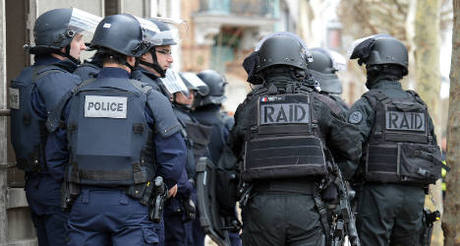Champs Elysees Attack: What We Know
إقرأ هذا الخبر بالعربية
A gunman shot and killed a policeman and wounded two others on the world-famous Champs Elysees avenue in Paris on Thursday night, in an attack claimed by the Islamic State group.
Here is what we currently know about the shooting, which took place just days before the first round of the French election.
- The attack -
At approximately 9:00pm (1900 GMT), the gunman pulled out an automatic weapon and opened fire on a police van just a few hundred meters from the iconic Arc de Triomphe on one of the world's most famous boulevards.
One officer was killed and the gunman fled on foot. During the ensuing gun battle -- witnesses spoke of a short but intense exchange of fire -- the suspected attacker was killed and two other officers wounded.
The Champs Elysees, busy with tourists and locals on a pleasant spring evening, became a scene of panic. Diners in some restaurants took refuge in basements while pandemonium broke out in the nearest metro station, according to witnesses.
Police sealed off the area immediately with dozens of emergency vehicles and helicopters buzzed overhead.
- Was it terrorism? -
Anti-terror prosecutors immediately took up the investigation and President Francois Hollande said it was "of a terrorist nature."
Police said the shooter was a known terror suspect who had been convicted in 2005 of three counts of attempted murder -- two of them against police officers.
The Islamic State jihadist group claimed that one of their "fighters" carried out the attack but said it was "Abu Yussef the Belgian", whereas French authorities believe the perpetrator was a 39-year-old Frenchman living in the Paris suburbs.
This raised concerns that a possible second attacker could be on the loose.
On Friday, France said they were hunting for a new suspect based on a Belgian alert received a day earlier, but it later emerged the man had handed himself into a police station in the Belgian city of Antwerp.
In the immediate aftermath of the shooting, U.S. President Donald Trump was in no doubt, saying: "It looks like another terrorist attack. What can you say? It just never ends."
- What impact on the election? -
France, which has suffered from a wave of bloodshed over the past two years killing more than 230 people, has long feared an attack on the presidential election, the first round of which takes place on Sunday.
Authorities foiled an attack in the southern city of Marseille just a day before a campaign appearance by far-right leader Marine Le Pen.
Polls suggest that voters have been influenced more by France's sluggish economy and sky-high unemployment than terror fears but analysts have always stressed that this would change in the event of bloodshed.
Le Pen is seen as the "hardest" on the terror threat and has switched her campaign rhetoric back to core issues of immigration and the fight against terrorism in recent days.
Some analysts have speculated that the attack could benefit conservative Francois Fillon, a former prime minister seen as an experienced hand at a time of crisis -- despite an expenses scandal that rocked his campaign.
The inexperienced front-running centrist Emmanuel Macron and late-surger from the far left Jean-Luc Melenchon are not seen as particular experts on security and foreign policy.
Macron is currently leading the polls but any of these four candidates could feature in the second-round run-off on May 7, surveys suggest.



